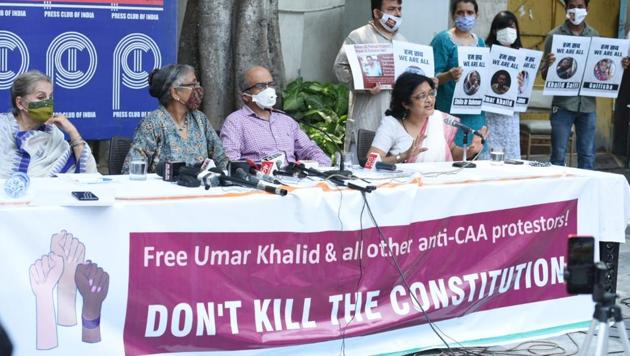Human Rights Defenders Data Information Knowledge Solidarity

HRDs must counter State's offensive of intimidating ordinary people, from expressing their opinion on social media or on various issues . Lawyers as well as Journalists, and youtubers bring these cases up in the public eye in order to youth to feel more secure speaking out.. This series we will document case law as well as reports through links to documents, reports from various websites and Blogs and Posts of HRDs. This is also an attempt to publicise all the dirty tricks State have been using. This is a contributory effort..
Delhi: Activists’ press conference condemns Umar Khalid’s arrest industantimes.com/delhi-news/delhi-activists-press-conference-condemns-umar-khalid-s-arrest/story-ytYu7ObphVAfGM6yzaM3YO.html By Kainat Sarfaraz
PUBLISHED ON SEP 13, 2020
Umar Khalid has been arrested for his alleged role in orchestrating the north-east riots in Delhi in February
Hindustan Times, New Delhi |

A group of civil society activists on Wednesday condemned the Delhi Police’s arrest of student activist Umar Khalid under the Unlawful Activities (Prevention) Amendment Act (UAPAA) Act, 2019, calling it an “inquisition of the anti-Citizenship (Amendment) Act (CAA), 2019 protests” and a “witch-hunt against young minds”.

प्रेस क्लब में हुई सार्वजनिक सभा, छात्र नेता उमर खालिद की रिहाई की मांग https://www.youtube.com/watch?v=yoSZ5SszJaQ
छात्र नेता उमर खालिद के एक साल से कैद में रखने के खिलाफ कई जानी-मानी हस्तियां सोमवार को एक साथ आईं और प्रेस क्लब ऑफ इंडिया में उमर खालिद को रिहा करने की मांग की। JNU से पीएचडी की पढ़ाई कर रहे और CAA, NRC के खिलाफ मुखर कार्यकर्ता के तौर पहचाने जाने वाले उमर खालिद को 13 सितंबर 2020 को दिल्ली पुलिस की विशेष शाखा ने पूछताछ के लिए बुलाया था और उत्तर पूर्वी दिल्ली में हुए सांप्रदायिक दंगे के सिलसिले में गिरफ्तार किया गया था।
BJP से लेकर Republic और News18 ने दिखाया Umar Khalid के खिलाफ 'सबूत' जो सबूत था ही नहीं #UmarKhalid https://www.youtube.com/watch?v=IOu8G_f6q5w
Delhi Police relied on trimmed video clip tweeted by BJP leader for FIR, says Umar Khalid in court https://scroll.in/latest/1003523/delhi-police-relied-on-video-clip-tweeted-by-bjp-leader-for-fir-says-umar-khalid-in-court
The court was hearing Khalid’s bail application in connection with an FIR lodged under the provisions of UAPA in the Delhi riots conspiracy case.
Senior Advocate Trideep Pais, appearing for Khalid said that he wrote to News18 and Republic TV seeking the raw footage of the speech they had aired on the channels. In response, News18 said that it did not have the raw footage and was taken from a tweet of a Bharatiya Janata Party leader.
Republic TV said that the source of the video was BJP’s Information Technology Cell head Amit Malviya, Pais told the court. “It is [a case of] copying the tweet from a politician and placing it as your own news item,” Pais argued.
Why India at 75 is ready for a sedition-less future https://indianexpress.com/article/opinion/columns/why-india-at-75-is-ready-for-a-sedition-less-future-7430939/ Upendra Baxi writes: Section 124-A needs to be wholly judicially repealed at the bar of the fundamental human right to free speech..
Kedar Nath (1962) did not go this far but the SC held that it was “reasonably clear” that the IPC punishes only “such activities as would be intended, or have a tendency, to create disorder or disturbance of public peace by resort to violence”. Put differently, “disloyalty to a government established by law is not the same thing as commenting in strong terms upon the measures or acts of the government, or its agencies”...Already, some law luminaries have found new stirrings of hope in the Supreme Court, while some others have insisted that we must not void the section but rather, as the learned attorney general observed, find constitutional ways and practical means to prevent the abuse and misuse of law.
The policy question is simple: Is the mighty sovereign Indian Republic so vulnerable to public and media criticism as to require the continuation of a colonial and repressive law? Directing the Government of India Press, on the pain of sanction, not to publish the voided sections of the law, or provisions which are read down, may be a necessary first step, but the real problem is to make political executive and law enforcement officials take most seriously the judicial directions reading down the criminal statutes...Any creation of “public disorder” or “disturbance of public tranquility” is already upheld as a reasonable restriction in other draconian collective security laws in the State’s arsenal, though even these would not justify uses of criminal law outside its stated purposes.
Democratic legality thrives on the axiom that powers given by the law must be exercised for the purpose for which it is given and for no other.
- Democracy, Dissent & Draconian Laws
- Sedition Has No Room in Modern Democracies
- 7 petitions on 124a
- Deafult Bail to 115 Bangalore Riots accused
- Former CJI on Sedition Law Sec 124A
- PUCL plea on Sedition
- Sedition Law
- UAPA’s inherently flawed architecture and the role of courts
- UAPA July 2019 amendments
- UAPA Terrorising Civil Society
Subcategories
BAIL
For UAPA articles under
Free Speech
Ban on films, documentaries by Government e.g documentary on PM by BBC. Debate on censorship, opinion, statements by media people, leaders, screening of film on Modi at universities etc.
Corporate Behaviour and Free Speech
In a defamation case against Paranjoy Thakurta, a court has order, issued on September 6, directed the removal of defamatory content from their respective articles and social media posts within five days. In the suit filed by Adani Enterprises Ltd, seen by HT, the allegedly defamatory material includes transcripts of YouTube videos, screenshots of X posts by journalists, and images of their X profiles.https://www.msn.com/en-in/news/India/mib-issues-takedown-notices-to-13-digital-news-publishers-over-adani-defamation-case/ar-AA1MIjBR
Based on this, The ministry of information and broadcasting (MIB) on Tuesday issued takedown notices to 13 digital news publishers on YouTube and Instagram for disseminating defamatory content related to Adani Enterprises Ltd.The ministry’s order names journalists, media houses, and creators — including Newslaundry, Ravish Kumar, Dhruv Rathee, The Wire, HW News Network, and Aakash Banerjee’s The Deshbhakt — who have received a list of 138 YouTube video URLs and 83 Instagram links to be taken down.


